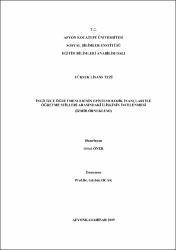| dc.contributor.author | Umut ÖNER | |
| dc.date.accessioned | 2019-05-14T12:01:34Z | |
| dc.date.available | 2019-05-14T12:01:34Z | |
| dc.date.issued | 2019 | |
| dc.date.submitted | 2019 | |
| dc.identifier.uri | http://hdl.handle.net/11630/5796 | |
| dc.description.abstract | Bu araştırmada İngilizce öğretmenlerinin epistemolojik inançlar ve öğretme stilleri çeşitli değişkenler açısından incelenmiştir. Araştırmada, İngilizce öğretmenlerine Epistemolojik İnanç Ölçeği (Deryakulu ve Büyüköztürk, 2002) ve Öğretme Stili Ölçeği (Sarıtaş ve Süral, 2010) kullanılmıştır. Araştırmaya 347 İngilizce öğretmeni katılmıştır. Araştırma verilerinin analizi sonucunda İngilizce öğremenlerinin epistemolojik inançları ile öğretme stilleri arasında anlamlı bir ilişki bulunmuştur. İngilizce öğretmenlerinin en fazla tercih ettikleri öğretme stilinin otoriter öğretme stili olduğu görülmüştür. İngilizce öğretmenlerinin öğrenmenin çabaya bağlı olduğuna inanç boyutunda daha gelişmiş inanca sahip oldukları anlaşılmıştır. İngilizce öğretmenlerinin öğretme stilleri ve epistemolojik inançlarının cinsiyete göre anlamlı bir fark göstermediği görülmüştür. 21-25 yıl kıdeme sahip İngilizce öğretmenlerinin, diğer alt gruplara göre daha gelişmiş inançlara sahip oldukları tespit edilmiştir. Ayrıca “süper lise”den mezun olan öğretmenlerin diğer okul türlerine göre daha yüksek düzeyde temsilci öğretme stiline sahip olduğu görülmüştür. | en_US |
| dc.description.abstract | Relationship between English teacher’s epistemological beliefs and teaching styles is investigated in terms of several variables in this study. Epistemological Belief Scale (Deryakulu ve Büyüköztürk, 2002) and Teaching Styles Scale (Sarıtaş ve Süral, 2010) were conducted in this survey. 347 English teachers were included in the study. As a result of the analysis, significant difference was found between English teacher’s epistemological beliefs and teaching styles. It was found that authoritarian teaching style was the most embraced style among English teachers. It was also found that English teachers had more sophisticated belief in the dimension of the belief of learning depending on effort. There was no significant relation between English teacher’s epistemological beliefs and teaching styles in terms of gender. English teachers experienced between 21 and 25 years had more sophisticated beliefs than others had. In addition, teachers graduated from foreign language based high schools had higher degree of delegator teaching style than teachers graduated from other type of schools | en_US |
| dc.language.iso | tur | en_US |
| dc.publisher | Afyon Kocatepe Üniversitesi Sosyal Bilimler Enstitüsü | en_US |
| dc.rights | info:eu-repo/semantics/openAccess | en_US |
| dc.subject | Epistemolojik inanç, İngilizce eğitimi, Öğretme stili, Yabancı dil öğretmeni | en_US |
| dc.title | İngilizce Öğretmenlerinin Epistemolojik İnançları İle Öğretme Stilleri Arasındaki İlişkinin İncelenmesi (İzmir Örneklemi) | en_US |
| dc.title.alternative | Investıgatıon Of The Relatıonshıp Between Epistemologıcal Belıefs And Teachıng Styles Of Englısh Teachers (Izmır Sample) | en_US |
| dc.type | masterThesis | en_US |
| dc.department | Afyon Kocatepe Üniversitesi, Sosyal Bilimler Esntitüsü | en_US |
| dc.relation.publicationcategory | Tez | en_US |



















